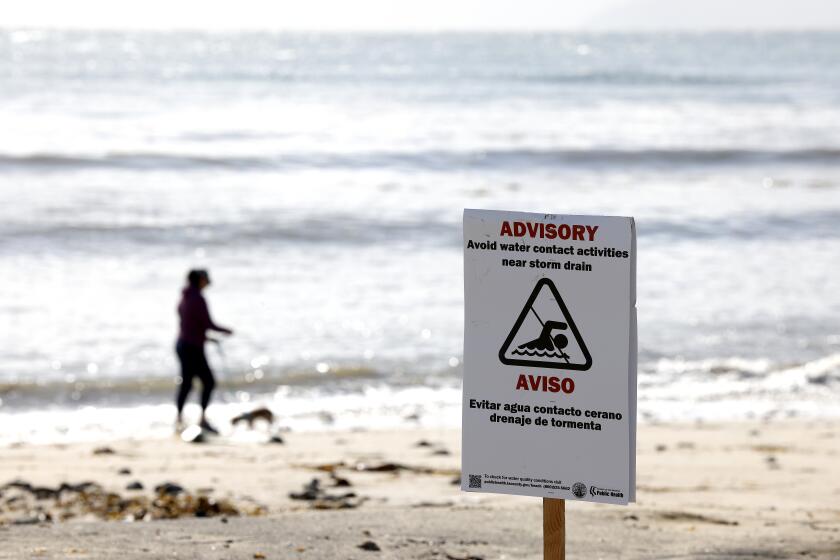Murder Trial Will Test an Unusual Defense
The prospective juror nodded knowingly as the lawyer defending an accused child killer asked if she had ever heard of a medical condition known as postpartum depression.
For a few days after the birth of her own child, the young woman in the jury box recalled, “I would start to cry for no reason . . . uncontrollably.”
The woman’s experience cut to the heart of the defense in an emotionally charged trial under way this week in Superior Court in Santa Ana--a defense that is unique to Southern California but one that is gaining some credibility nationwide.
A jury in the trial will be asked to think the unthinkable--to imagine that an apparently caring person and enthusiastic mother, gripped by a rare maternal sickness that even experts do not fully understand, could mentally “snap” and brutally kill her own newborn.
The facts in the case, grisly as they are, remain essentially undisputed:
On her birthday in April, 1987, then-23-year-old Sheryl Lynn Massip of Anaheim, distraught over the constant crying of her colicky 6-week-old son, tried to throw the child and herself into oncoming traffic, police said. Then, she hit him over the head with a blunt instrument. And finally, she told her husband and a court-appointed psychiatrist, she twice ran over the child with her car.
The infant’s battered body was found dumped in a trash can shortly after Massip first told police that the child had been snatched from her arms by a mystery woman with red hair and a gun.
Massip’s lawyer, Milton C. Grimes, pushing for an insanity acquittal, calls the killing “a textbook case of postpartum psychosis.” That is a rare and still-puzzling disorder--an extreme form of the common “baby blues”--that some researchers say can prompt tremendous biological and mental changes and even violence in some mothers.
Prosecutors call the case something else: murder.
‘This Isn’t It’
“I think there probably is such a thing as postpartum psychosis, but this isn’t it,” said Orange County Deputy Dist. Atty. Thomas J. Borris in an interview as he and defense attorney Grimes began selecting jurors for a trial that is expected to last a month.
“This is a woman who murdered her child and then engaged in a grand kidnaping cover-up story that was lucid and coherent,” Borris said. “She’s not crazy; she appears to be normal today.
“I’ve talked with women who have killed their babies, and the ones who were suffering from this illness are suffering for life. They weren’t the bouncy woman we see in court today.”
Experts who have examined Massip disagree over her sanity at the time of the killing, reflecting the deep divisions in the psychiatric profession over the causes, symptoms and diagnoses of such cases. The few lawyers and psychiatrists who have worked with postpartum depression will be watching the Orange County case closely.
Those close to Massip say that she, too, wants to help shed light on a disease that may be unfamiliar even to women suffering from it and plans to speak out publicly after her trial.
Won’t Discuss Case
(Massip declined to discuss her case for this story, saying, “That will all come out in the trial.”)
The young woman’s first concern is more immediate: proving to a jury that she is not guilty by reason of temporary insanity of a murder charge that could send her to prison for 26 years to life.
Those close to Massip, who is living at an undisclosed location, insist that the one-time accordion player and softball pitcher is anything but the “bouncy” and unrepentant killer that the district attorney’s office describes.
“I never want to see my worst enemy go through what she has,” said Grimes, the defense attorney. “Working on this case, seeing her, has affected me more greatly than any other case. It’s made me a different man and a different father.”
Family and friends say Sheryl Massip has endured tremendous pain from an ordeal that cost her a baby she desperately wanted and a husband she idolized. Alfredo Massip, father of the dead child, divorced Sheryl soon after her arrest and is now a prime witness for the prosecution.
‘Scared for My Daughter’
In a tearful interview outside the courtroom last week, Ed DeLano of Rowland Heights, father of the defendant, said: “I’m scared for my daughter, and I hate to see her go through this. Up to that point (of her alleged illness), she was a perfectly fine individual.
“I know that was not my daughter operating out there (when she killed her child). My daughter was absolutely incapable of killing anyone or anything.”
And so it will be up to a jury to decide what Sheryl Massip’s mental state may have been when she ran over her own child on April 29, 1987.
Two years after her marriage to the Cuban-born Alfredo Massip, Sheryl Massip was pregnant. And the parents could not have been happier.
Massip got the baby boy that she and her husband had wanted badly, and the proud parents named their first-born Michael Alfredo Massip. The father’s parents unfurled a banner on their street, hailing the joyous event.
But family and friends say things changed suddenly after the child was born.
Lorene Jonsson, who lived in the apartment across the hall from the Massips and who frequently offered to help with the child, saw “a dramatic change in (Sheryl Massip’s) personality.”
In place of the “very happy, excited, expectant mother” Jonsson had known only a few weeks before, Massip became “really depressed-looking, walking around with her face down all the time,” the neighbor recalled.
Frustrated, Distressed
The baby cried 15 to 18 hours a day, Sheryl Massip later told the court-appointed psychiatrist. And the more the baby cried, the more frustrated and distressed the mother became.
“She was very much in love with her husband, and she was afraid that the husband would think of her as a bad mother because of all the crying and wouldn’t love her as much,” Jonsson said.
According to her family, Massip had trouble sleeping and would often have to go to her father’s home to try to get some rest. She could not eat. She often cried inexplicably. Her eyes constantly bloodshot and her face drawn, she deteriorated physically and became listless. A younger sister had to bathe her. She sought medical help.
“She didn’t know what was happening to her, and she tried in every way she knew how to get help,” her father said. “The doctors, her family--we tried, but obviously we didn’t do enough. I’m mad at myself.”
Then came her birthday in 1987, 43 days after Michael’s birth and the day that Ed DeLano says his daughter “snapped.”
Stayed With Her Father
Massip had stayed at her father’s home the previous night, trying to rest. She went home around 8 a.m. and woke her husband, who had stayed with the baby.
According to testimony he offered in court during the preliminary hearing in July, 1987, Alfredo Massip gave the baby to his wife and, having been kept up much of the night himself by Michael’s crying, went back to sleep.
He never saw his son alive again, he said.
Police said that several hours after taking the child from her husband, Sheryl Massip ran over the infant with her car and dumped the body several blocks away in a trash can.
Massip heard “voices” telling her to “put him out of his misery,” she later told a court-appointed psychiatrist.
“My mind did not want to believe it,” she told the psychiatrist. “Satan had taken . . . over.”
Calls Story a Ruse
Alfredo Massip, who runs a janitorial service, told the court in a preliminary hearing that he quickly realized that the kidnaping story his wife initially gave to him and the police was a ruse.
“Where’s the baby?” Alfredo Massip recalled asking his wife shortly after police began their investigation. After a pause, “her first words were, ‘I’ll rot in hell,’ ” he said. “She said that about three times. . . . Then she told me that she had run over the baby.”
He hugged his wife, he said. But in his court appearance last year, Alfredo Massip--who has remained silent about the case--showed little sympathy for the woman he would soon divorce.
Asked if he loved her, he told the court: “Right now? No.” And then: “I hate what she did. . . . I have no feelings (toward her).”
Postpartum depression is believed to afflict about one in 10 new mothers. The disorder can show itself through abnormal behavior such as crying uncontrollably, undergoing massive panic attacks or running down the street naked. And in extreme cases, experts say, the depression can turn to psychosis and violence.
Dr. Susan Hickman, a San Diego psychotherapist who runs a private counseling group called the Postpartum Mood Disorder Clinic, said that her research suggests that 64 babies may be killed in California each year by mothers suffering from the disorder, with most of the cases going unreported or listed as child abuse killings or crib deaths.
Yet the illness itself is relatively unexplored. Some critics even challenge its existence, while other researchers differ over its roots.
Hickman, for instance, insisted that postpartum depression is caused by a hormonal deficiency, with its symptoms having little or no connection to outside events.
Not a Shred of Evidence
But Dr. Leslie Hartley Gise, a psychiatrist at Mt. Sinai School of Medicine in New York who has studied the phenomenon, said there exists not a shred of evidence to support such a biological theory. Researchers simply do not know how the disorder works, she said in an interview.
The disorder has created even more turmoil in the courts than it has in the psychiatric clinics.
To date, legal analysts say the postpartum psychosis-insanity defense has been used in about 15 trials across the country, with guilty verdicts and acquittals handed out about evenly.
The Massip case is believed to be the first in Southern California in which the defense will be used. A Sacramento woman was acquitted by reason of insanity after killing her child in 1983.
More to Read
Start your day right
Sign up for Essential California for news, features and recommendations from the L.A. Times and beyond in your inbox six days a week.
You may occasionally receive promotional content from the Los Angeles Times.






